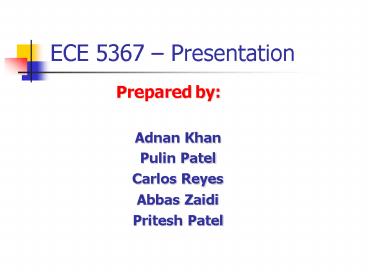ECE 5367 Presentation - PowerPoint PPT Presentation
1 / 19
Title:
ECE 5367 Presentation
Description:
... with foreign material (eyeglasses or contact lenses. ... Sunglasses and colored contact lenses pose no impediment to recognition. Biggest Advantages ... – PowerPoint PPT presentation
Number of Views:100
Avg rating:3.0/5.0
Title: ECE 5367 Presentation
1
ECE 5367 Presentation
- Prepared by
- Adnan Khan
- Pulin Patel
- Carlos Reyes
- Abbas Zaidi
- Pritesh Patel
2
Biometrics
3
What is
- Automatic recognition of a person using
distinguishing traits - Measurable quantifying traits
- Robustness extent to which trait changes over
time - Distinctiveness measure of variations among
patterns over a population
4
Biometrics as Authentication
Something you are Biometric
Increasing level of security Increasing
convenience
Something you know PIN, password
Something you have card, token
5
Definition (contd.)
- Identification
- Who is Who?
- one-to-many search (1N)
- Used in identifying criminals
- Verification
- Is this Him/Her?
- one-to-one search (11)
- Used for physical or computer access
6
Biometric Technologies
- Fingerprint
- Fingerprint pattern read matched electronically
- Iris Recognition
- Measurement of the Iris pattern of the eye
- Facial Recognition
- Recording spatial geometry of distinguishing
features - Speaker/Voice Recognition
- Voice or speaker recognition uses vocal
characteristics for identification
7
Facial Recognition
- Based on ability to recognize faces
- Nodal points
- 80 nodal points on the face
- E.g. Distance between eyes, width of nose,
Cheekbones, Chin etc - Face-Print code of the face
- Numerical Code
- String of numbers
8
Facial Recognition (contd.)
- Algorithm
- 1) Capture Image
- 2) Find Face on the image
- 3) Extract Features (to generate template)
- 4) Compare Templates
- 5) Declare Matches
- Show Example
9
Fingerprint
- Formation of a unique signature
- Combination of Environmental and Genetic Factors
Position of foetus, density of amniotic fluid,
DNAs impact on each ridge - The lowest mis-identification rate after Iris
recognition - Three main methods of capturing finger print
- Thermal Imaging
- Capacitance Scanner
- Optical Reader
10
Thermal Imaging Sensor
The sensor uses the heat patterns of the finger
to create slices of a person's fingerprint Each
slice is then lined up using centering techniques
11
Capacitance and Optical
Capacitance Sensing The plates act as
capacitors Finger acts as third plate Capacitance
under ridge higher Capacitance under valley lower
Optical Sensing Uses Charged Coupled Devices
(CCD). An Array of photosites which allow a
current to flow through when hit by photons.
Darker areas are valleys and lighter areas are
ridges.
12
Analysis of the Prints
- Typica
- Minutiae
- Placement of ridges and
- valleys
- 2) Bifurcations
- Splitting of lines into two and
- their recombining
13
Iris Recognition
- Background
- Identifying persons without physical contact
- Used by the U.S. government, correctional
facilities, nuclear utilities, banks, etc. - The iris is the externally visible, colorful,
donut-shaped organ surrounding the pupil of the
eye.
14
Iris Recognition contd(2)
- Uniqueness of the Iris
- The iris is unique because of the
morphogenesis of that organ. - Stability of the Iris
- An iris is not normally contaminated with foreign
material (eyeglasses or contact lenses.) - It is not subject to deleterious effects of
aging. The features of the iris remain stable and
fixed from about one year of age until death.
15
Iris Recognition contd(3)
- Hamming Distance Calculation
16
Iris Recognition contd(4)
- Recognition Speed
- Determined by the speed of the processor and size
of the database (normally less than two seconds).
- Sunglasses and colored contact lenses pose no
impediment to recognition. - Biggest Advantages
- Accuracy with an order of magnitude greater than
other biometric systems.
17
Voice Recognition
- Automated process of identifying a specific
individual's voice - Sound signal is digitized
- Result is a simple yes/no decision
- Deployed in such areas as banking, account
access, home PC and network access
18
Voice Recognition (cont)
- Advantages
- Easy to use and require no special training
- No need to periodically manage/change passwords
- Relatively inexpensive compared to other
biometrics
19
Questions?































